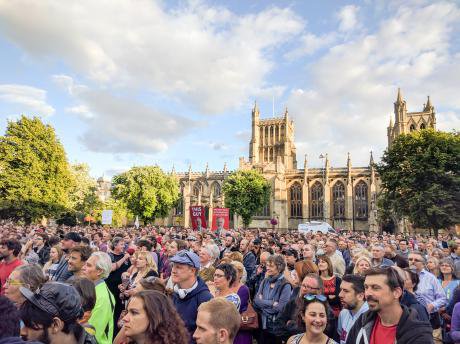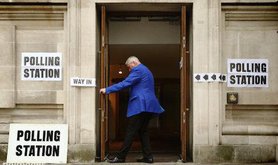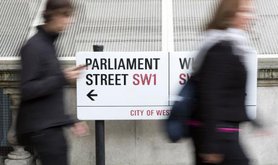
Image: Rally for Jeremy Corbyn, 2016. Paul NUK/Wikimedia, Creative Commons.
Trade unions have long been at the forefront of demands for political reform – dating back to the Chartists' fight for universal suffrage. Now they’ve launched a new campaign for fair votes.
But in the centenary year of expanded suffrage, few could deny that there is still plenty of work to be done to enhance democracy.
Westminster’s voting system has allowed governments to form with very little popular support. In 2010, the Conservatives secured 36% of the vote – but 47% of seats. In 2015, they secured 37% of the vote – and 51% of the seats. And last year, they won 44% of the vote but just a whisker-off the majority of seats.
This isn’t about mere statistics though. The polarisation and swings we see under Westminster’s disproportionate voting system mean any gains Labour make are often swiftly undone by the next right-wing government – as we have seen this past few years with the attacks on workers’ rights.
There are broader inequities too. Our 16 and 17-year-olds are denied a voice, while millions of eligible voters are not registered.
And while people struggle to earn a decent living, nearly 800 unelected peers in the House of Lords treat our Parliament as a private members’ club.
Trade unionists have started to believe that enough is enough. Building on Jeremy Corbyn’s rhetoric of a party ‘for the many’, we believe it is now time for a Politics for the Many.
With each impediment to political equality – from voter ID to rigged boundary reviews – the need for a democracy fit for the 21st century gets ever stronger.
For those of us on the left, there is a growing realisation that this kind of political injustice breeds alienation and only aids negative forces.
But now new analysis shows that Westminster’s voting system could actually lock Labour out of power – even if it won the most votes.
Last week, influential election website Electoral Calculus projected a ‘wrong winner’ scenario if a General Election were held now.
Under the projections, Labour would secure the most votes in a GE – yet would win fewer seats than the Conservatives.
The analysis, based on polling from the end of February, predicts the Conservatives would win 40.5% of the vote and 297 seats, whereas Labour would win 279 seats on 40.7% of the vote.
That would mean Parliament’s outdated electoral system would be failing at its most basic requirement: ensuring the most popular party won the most seats.
And while they are only initial projections, these figures show just how broken Westminster’s voting system is. A ‘wrong winner’ scenario would be an absolute scandal for our democracy – and the fact it is even on the cards is an absolute indictment of the Commons’ current set up.
For a long time, proponents of the status quo have suggested Westminster’s disproportionate voting system is ‘simple’ and ‘easy for voters to understand’. It’s hard to see how that argument holds any water anymore – not least when a party can be penalised for having the most support.
Nor would a ‘wrong winner’ scenario be a first for the UK: in 1951 the Conservative Party won 48% of the vote to 48.8% for Labour, yet the election saw a Conservative majority.
Internationally there are other precedents under disproportionate voting systems, with New Zealand seeing two wrong winner elections in a row in 1978 and 1981.
These democratic disasters set them on the path to electoral reform. New Zealand now uses Holyrood’s Additional Member System – backed by the current Labour government and figures across the well-represented progressive spectrum.
The mechanics of the electoral college in the United States are also similar – delivering Presidents who did not win the popular vote in 1876, 1888, 2000 and 2016. We know only too well the disorder and disaffection – not to mention the sheer absurdity – that this has caused.
There has long been a campaign for Labour to back fair votes in the UK. But unions have a significant role to play as the voice of workers on the ground. Indeed, it was unions swinging behind the pro-PR movement that proved crucial in ensuring reform in New Zealand.
Trade unionists have now launched a new campaign, ‘Politics for the Many’ to call on Labour and unions to back root and branch democratic reform, in the light of both the centenary of suffrage – and the urgent need for proportional representation.
Politics for the Many has support from senior figures from the UK’s leading trade unions, including Howard Beckett, Assistant General Secretary at Unite and the PCS’ Mark Serwotka.
Day after day we see more evidence the current system is desperately broken. We need a democracy fit for the 21st century. Trade unionists and Labour should get on board.
See the new Politics for the Many website and join its dedicated Facebook page here.
Read more
Get our weekly email




Comments
We encourage anyone to comment, please consult the oD commenting guidelines if you have any questions.